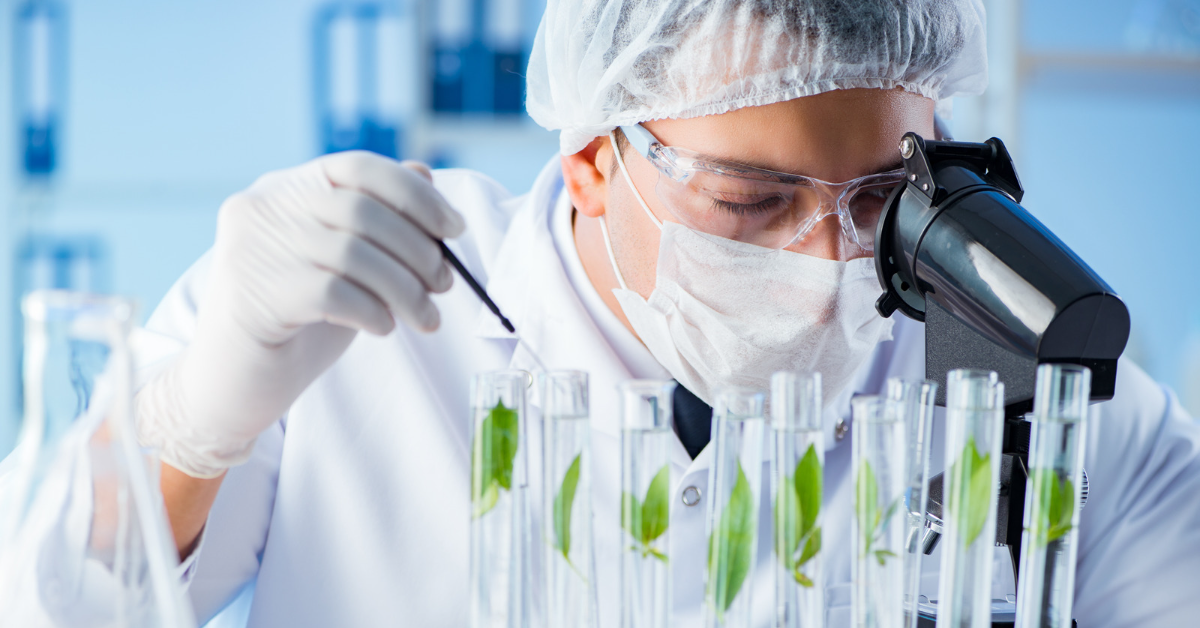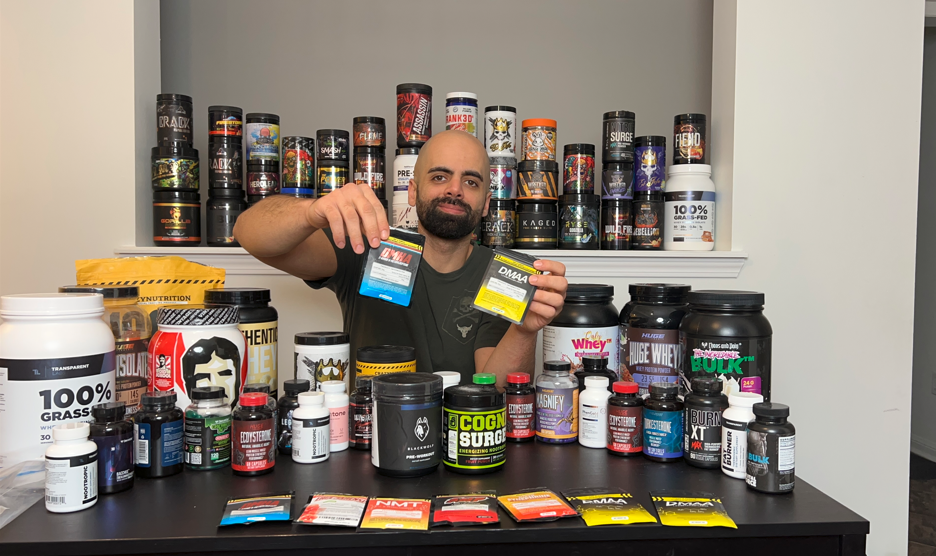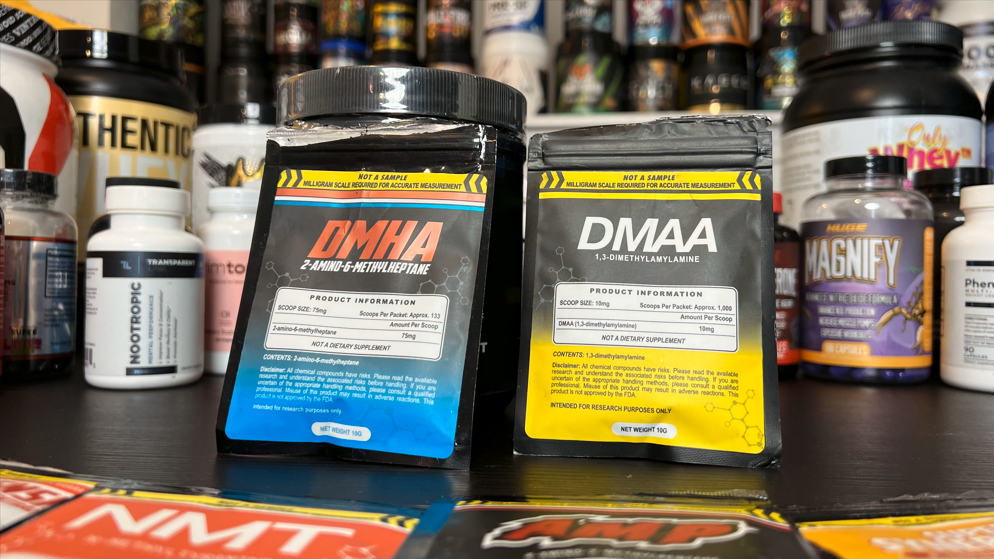
DMAA is synthetic, not naturally derived from geraniums, challenging its legal status and safety as a supplement ingredient.
This article compares the safety, benefits, and legal nuances of Geranium Extract and DMAA, directly addressing the myths and facts that fitness enthusiasts should know.
Geranium extract is a natural substance derived from the stem and leaves of the geranium plant.
It's often used in traditional medicine and is known for its antioxidant and anti-inflammatory properties.
On the other hand, DMAA (1,3-dimethylamylamine) is a synthetic compound that was originally developed as a nasal decongestant.
It's a potent central nervous system stimulant often found in pre-workout and weight-loss supplements.

Geranium Extract is derived from the plant species Pelargonium graveolens.
The plant, native to South Africa, is widely cultivated for its oil, which is used in perfumery and traditional medicine.
The extract has been used for centuries in various cultures for its medicinal properties.
The primary active components of Geranium Extract are a group of chemical compounds known as monoterpenoids and sesquiterpenoids.
These compounds are believed to be responsible for the plant's therapeutic effects.
In traditional medicine, Geranium Extract has been used for various purposes, including treating wounds, burns, and ulcers.
It has also been used to treat conditions such as dysentery, hemorrhoids, and inflammation of the eyes.
Currently, there is limited information on the potential side effects of Geranium extract.
However, like any other natural product, it's important to use it responsibly and under the guidance of a healthcare provider.
When using Geranium extract topically, some individuals may experience allergic reactions or skin irritation.
Always do a patch test before using any new product on your skin.
There is a growing body of research on the potential health benefits of Geranium Extract.
For instance, a study highlighted in the Nutrition Journal sheds light on geranium extract's potential benefits for vascular function.
Researchers conducted a double-blind, placebo-controlled trial, where participants were divided into two groups.
One group received geranium extract, while the other was given a placebo.
Key Findings:
Why It Matters: These results suggest that geranium extract's antioxidants might help improve vascular health, offering more than just an energy boost for your workouts. It's an insight into how natural supplements could support overall well-being, alongside their traditional use in enhancing athletic performance.
By integrating geranium extract into your routine, you're not just aiming for immediate pre-workout benefits but potentially supporting your heart's health in the long run.
Another study found that Geranium Extract could be used in the treatment of chemo- and radiotherapy-induced toxicity, in chemoprevention, in cardiovascular diseases and neurodegenerative diseases, in oral health, or as a cosmeceutical.
It's important to note that while these studies are promising, more research is needed to fully understand the potential health benefits and risks of Geranium Extract.
Geranium extract is rich in antioxidants, which can help protect the body against damage from free radicals.
It also has anti-inflammatory properties, which can help reduce inflammation.
Some studies suggest that geranium extract may help improve exercise performance and recovery, although more research is needed.

DMAA, or 1,3-dimethylamylamine, is a synthetic compound originally developed as a nasal decongestant by the pharmaceutical company Eli Lilly.
In recent years, it's been used as an ingredient in pre-workout and weight-loss supplements due to its stimulant effects.
DMAA is known for increasing energy levels, enhancing focus, and improving athletic performance.
The Shift in Use: Originally developed by Eli Lilly as a nasal decongestant, DMAA (1,3-dimethylamylamine) has taken on a new life in the world of fitness. Its transition into dietary supplements has caught the eye of athletes and gym enthusiasts seeking that extra edge in their workouts. However, this shift has not gone unnoticed by regulatory bodies, sparking debates over its safety and legality.
Benefits of DMAA:
Risks Associated with DMAA: Despite its benefits, DMAA comes with its share of risks, prompting caution:
The Balanced View: While DMAA offers notable advantages for enhancing workout performance, understanding its risks is crucial. This balanced perspective ensures that users can make informed decisions about incorporating DMAA into their fitness regimen, weighing the potential for improved performance against the importance of health and safety.
DMAA is a potent central nervous system stimulant.
It can increase energy levels, enhance focus, and improve athletic performance.
Some users also report that DMAA can help suppress appetite, benefiting those trying to lose weight.
Here are some potential benefits:
While DMAA can significantly boost energy, it's not without its risks.
Some users have reported side effects such as increased heart rate, high blood pressure, and nervousness.
In rare cases, DMAA has been linked to more serious health problems, including heart attacks and strokes.
Despite its potential benefits, DMAA has been associated with several adverse effects and banned in several countries due to safety concerns.
Natural vs. Synthetic Origins
The Controversy Explained
The claim that DMAA is derived from geranium plants has been a point of contention.
Scientific scrutiny and FDA investigations reveal that DMAA, as found in supplements, does not naturally occur in geraniums.
This dispute centers on studies and regulatory reviews, which conclude that DMAA's presence in supplements is synthetically added, challenging the claims of it being a natural extract.
DMAA and Geranium extract are quite different in their origins and uses.
DMAA is a synthetic compound known for its stimulant effects and is often used in pre-workout supplements and weight loss products.
On the other hand, Geranium extract is a natural product derived from the Geranium plant known for its antimicrobial properties and rich phytochemical content.
Despite these differences, both DMAA and Geranium extract have been associated with health benefits such as increased energy and focus (DMAA) and antimicrobial activity (Geranium extract).
However, both also come with potential side effects.
DMAA has been linked to serious cardiovascular and neurological risks, while the potential side effects of Geranium extract are less well-known but could include allergic reactions or skin irritation.
It's important to note that while DMAA was once claimed to be a natural constituent of Geranium, it has been widely disputed and is not supported by scientific evidence.
Therefore, the use of Geranium extract does not equate to the use of DMAA.
When comparing geranium extract and DMAA, it's clear that both have their pros and cons.
Geranium extract is a natural substance with antioxidant and anti-inflammatory properties, but its stimulant effects are not as strong as DMAA.
On the other hand, DMAA is a powerful stimulant that can significantly enhance athletic performance. Still, it comes with a risk of serious side effects and is considered illegal by the FDA.
DMAA's Legal Battles
The legal landscape for DMAA has been tumultuous, with the FDA taking a firm stance against its classification as a dietary supplement.
This is due to safety concerns and the lack of evidence supporting its natural occurrence in geranium plants.
Recent court decisions have largely supported the FDA's position, impacting the availability and use of DMAA in products.
Consulting Healthcare Providers
Both geranium extract and DMAA carry health implications, especially for those with pre-existing conditions.
It's crucial to consult healthcare professionals before incorporating these substances into your regimen, ensuring safety and appropriateness for your health needs.

Company Reputation & Claims
Trustworthy brands matter. While some claim their Geranium Extract rivals DMAA in potency, effectiveness often boils down to the manufacturer's integrity. Always verify claims against user reviews and product transparency.
User Reviews: A Spectrum of Experiences
Effectiveness: Expectation vs. Reality
Geranium Extract's effectiveness varies, sometimes matching DMAA's energy boost, depending on the formulation. However, DMAA's consistent, strong effects come with higher risks, making it crucial to weigh benefits against potential health concerns.
Navigating Marketing Claims
Skepticism is healthy when encountering products marketed as having DMAA-like effects from Geranium Extract. Investigate the brand, seek out ingredient lists, and consider the science behind the supplements.

Is DMAA derived from geranium plants?
No, despite early claims, extensive research and regulatory reviews have found that DMAA is a synthetic compound and not naturally derived from geranium plants.
What are the benefits of using Geranium Extract?
Geranium Extract is known for its antioxidant and anti-inflammatory properties, which can support overall health, including potential improvements in vascular function and exercise recovery.
Can DMAA enhance athletic performance?
Yes, DMAA is a potent central nervous system stimulant that can increase energy levels, enhance focus, and potentially improve athletic performance.
Is DMAA legal to use in dietary supplements?
As of the latest regulatory guidance, DMAA is not recognized as a legal dietary supplement ingredient in many countries, including the United States, due to safety concerns.
Are there any side effects associated with Geranium Extract?
Geranium Extract is generally considered safe, but some individuals may experience allergic reactions or skin irritation, especially when applied topically.
What are the risks of using DMAA?
DMAA can lead to serious side effects, including increased heart rate, high blood pressure, and cardiovascular events, particularly when used in high doses or combined with other stimulants.
How can I identify supplements with DMAA?
Check the ingredient list for 1,3-dimethylamylamine, methylhexanamine, or geranium extract, as these terms may indicate the presence of DMAA.
Are there natural alternatives to DMAA for pre-workout energy?
Yes, natural alternatives like caffeine, beta-alanine, and creatine can provide pre-workout energy boosts without the risks associated with DMAA.
Can Geranium Extract be used for weight loss?
While Geranium Extract may have health benefits, there is limited evidence to support its use specifically for weight loss.
Should I consult a healthcare provider before using supplements containing Geranium Extract or DMAA?
Yes, it's important to consult with a healthcare provider before using any new supplements, especially if you have pre-existing health conditions or are taking other medications.
While geranium extract and DMAA have their benefits, they also come with risks.
It's important to research and consult with a healthcare professional before starting any new supplement regimen.
Useful Links
 About FitFrek
About FitFrekFitFrek operates as an independent platform, offering comprehensive workouts, programs, routines, guides, and unbiased reviews to accelerate your progress. We pride ourselves on our honesty, delivering straightforward and candid insights. FitFrek does not offer medical advice, diagnosis, or treatment services.